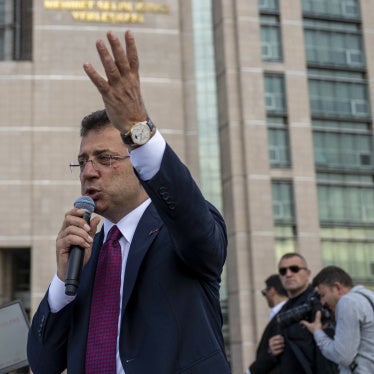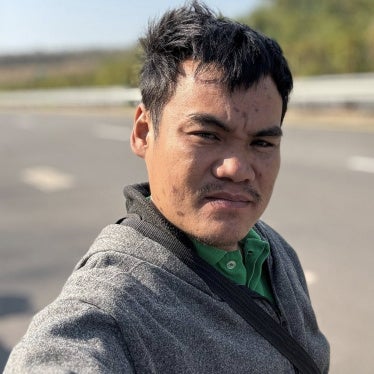To:
Minister of Interior Ivan Langer
Minister of Justice Jiří Pospíšil
Czech Republic
Brussels, 17 December 2008
Re: EU Network of contact points on genocide, crimes against humanity and war crimes
Dear Minister Langer and Minister Pospíšil,
We are writing to urge the Czech Republic to call a 6th meeting of the EU network of contact points in respect of persons responsible for genocide, crimes against humanity, and war crimes during its term in the EU Presidency.
In light of the network's important contribution to the fight against impunity for serious human rights violations, we, the undersigned organizations, urge the Czech Republic to make a firm commitment to hold a network meeting during its Presidency.
Established by Council decision 2002/494 JHA, the EU network of contact points in respect of persons responsible for genocide, crimes against humanity and war crimes (the "EU Network") was created to facilitate and increase cooperation among member states in the investigation and prosecution of these crimes at a national level. Article 5 of Council decision 2003/335/JHA states that the contact points "shall meet at regular intervals" at the Presidency's initiative. As France, current holder of the EU Presidency, has declined to organize an EU Network meeting, it is essential that the Czech Republic convene a meeting to ensure that the EU Network's contact points maintain their working relationships and deepen their exchange of information and experience.
1. Judicial cooperation is essential to the effective use of universal jurisdiction laws.
Several European states, including Belgium, Denmark, Germany, France, the Netherlands, Spain and the United Kingdom, have begun to use their universal jurisdiction laws to investigate and prosecute alleged perpetrators of grave international crimes.
Since the first meeting of the EU Network, in November 2004, a number of cases have been successfully prosecuted in Europe. These include two Afghan military officers convicted in the Netherlands of war crimes committed in Afghanistan, an Argentine officer convicted by a Spanish court of crimes against humanity in Argentina, three Rwandan nationals convicted before a
Belgian court for participating in the Rwandan genocide, an Afghan warlord convicted in the United Kingdom for torture committed in Afghanistan, and the convictions in abstentia by French courts of one Mauritanian officer and one Tunisian national for torture committed in their respective countries. Sharing these trial experiences has been extremely helpful in assisting EU member states to conduct more effective investigations and prosecutions of international crimes.
Also, the fifth meeting of the Network that took place in The Hague on March 17th and 18th, 2008, confirmed the value of the EU Network as a dedicated forum to discuss and advance regional collaboration and judicial cooperation at the EU level to hold accountable those responsible for grave violations of human rights and humanitarian law.
It is important to note that most national prosecutions for international crimes committed abroad have so far taken place in EU member states. It is therefore essential to continue strengthening an effective and reliable forum such as the EU Network of contact points on war crimes, crimes against humanity and genocide to fulfil the EU's aspiration not to be a safe haven for war criminals.
2. The EU Network has fostered important collaboration in the fight against impunity.
In its meetings to date, the EU Network has achieved results which underscore the importance of its continued role in contributing to the ending of impunity for the most serious crimes.
The meetings of the EU Network have enabled the national "contact points" (national judicial officials such as prosecutors or police investigators whose nomination was requested under the Council Decision establishing the EU Network) to meet and make bilateral contacts. Since the first meeting of the EU Network, a list of contact points from EU member states is available, and prosecutors and investigators have contacted colleagues in other EU member states to seek information about countries under investigation and practical advice. An email listserv was established as a result of the increasing demand for continuous communication in between meetings and in order to facilitate more informal information exchange.
The EU Network meetings have enabled the contact points to exchange information about the status of respective national legislation on prosecution of international crimes, practical enforcement advice, and relevant information about successful cases. Contact points who attended the fourth and the fifth meetings emphasized that the discussions enhanced mutual cooperation and allowed them to share experiences on how to overcome challenges with respect to, inter alia, the taking of witness testimonies in the field, handling extradition requests from non- European countries and cooperation with (non-) governmental organisations.
The EU Network meetings have enabled national authorities to consult with officials from the International Criminal Court (ICC) and the International Criminal Tribunals for Rwanda (ICTR) and the former Yugoslavia (ICTY), whose area of expertise is particularly relevant to their work on the investigation and prosecution of international crimes.
Finally, the EU Network has created an opportunity for practitioners to identify common needs that could be addressed jointly, possibly via action by the EU Network. For example, at the third EU Network meeting, participants concluded that they had common gaps in knowledge and expertise which could be addressed through joint training sessions for investigators and prosecutors from different states.
3. A 2009 meeting of the EU Network would address a number of current challenges in the fight against impunity for genocide, crimes against humanity, and war crimes.
Practitioners are making progress in addressing many of the challenges presented by the investigation and prosecution of serious international crimes. The establishment and existence of the EU Network reflects the commitment of member states to the fight against impunity for these crimes.
Yet, past cases and discussions among contact points illustrate that member states and observer countries could introduce specific practical and legal measures to render investigations and prosecutions more effective. In particular, the contact points identified the following issues as ones that may benefit from further exchange of information: case selection, extradition of suspects, traumatized witnesses/witness fatigue, specialized training and jurisprudence on international law.
Moving forward, we believe that the EU Network meetings in their current broader format could be supplemented by focused sessions that would gather all interested contact points to discuss these specific challenges.
Finally, at the fifth EU Network meeting, participants underscored the need for a permanent and autonomous secretariat for the Network that would ensure its stability and enable it to live up to its potential. A meeting of the EU Network during the Czech Presidency could thus address practical arrangements, resources and a mandate for the Secretariat and its liaison with the rotating EU Presidency.
Furthermore, with the completion strategies for the ad hoc Tribunals for Rwanda, the Former Yugoslavia and Sierra Leone underway, there is particular urgency for national prosecuting authorities to work together to ensure that there is no impunity gap created by the closure of those institutions. Indeed, for example, practitioners from several EU member states have requested an urgent meeting of the EU Network to discuss how best to respond to the presence of Rwandan genocide suspects in EU Member States and to extradition requests from Rwanda. Established to assist Member States in addressing such challenges, the EU Network is the ideal forum for such a discussion and exchange of experiences.
In conclusion, national experiences presented during the EU Network meetings demonstrated that the investigation and prosecution of grave international crimes committed abroad at the national level is not only possible but is also an important component of the fight against impunity for these heinous crimes.
The establishment of the International Criminal Court (ICC) has not removed the need for effective national prosecutions of war crimes, crimes against humanity and genocide. In fact, because of the court's limited jurisdiction and capacity, it could not have prosecuted any of the cases that have been successfully brought to justice in Europe so far. Also, as affirmed in the Council decision establishing the Network, the investigation and prosecution of international crimes remains the primary responsibility of national authorities under international law.[1]
The EU Network is therefore a necessary component of European and international efforts to bring perpetrators of serious international crimes to justice. Past meetings of the EU Network were called by the Member State holding the Presidency of the EU and organized in collaboration with other Member States, the General Secretariat of the EU, Eurojust and representatives from non-governmental organisations with expertise in the area. We are therefore pleased to offer our assistance, if needed, to the Czech Presidency in the organization of the 6th meeting of the EU Network.
In light of the above, we urge you to convene a meeting of the EU Network in 2009 and, in so doing, send a clear message about the EU's commitment to ending impunity for serious human rights crimes.
We thank you for your attention to this important matter.
Yours sincerely,
Richard Dicker
Director
International Justice Program, HRW
Carla Ferstman
Executive Director
REDRESS
Souhayr Belhassen
President
FIDH
William R Pace
Convener
Coalition for the ICC
Cc:
Heads of Delegation to the Article 36 Committee
Javier Solana, Secretary-General of the Council of the European Union
Jaques Barrot, European Commissioner for Justice, Freedom and Security
[1] Preamble, Article 6. O.J. L 167/1 26.6.2002








